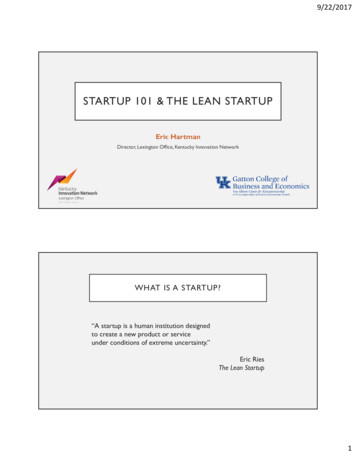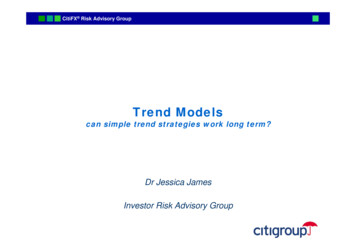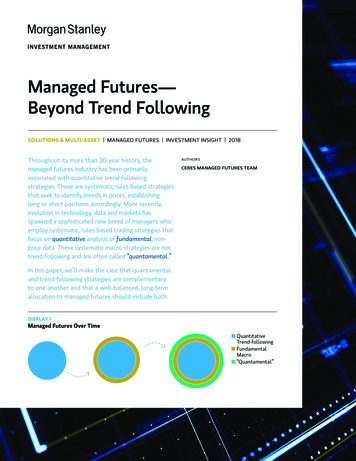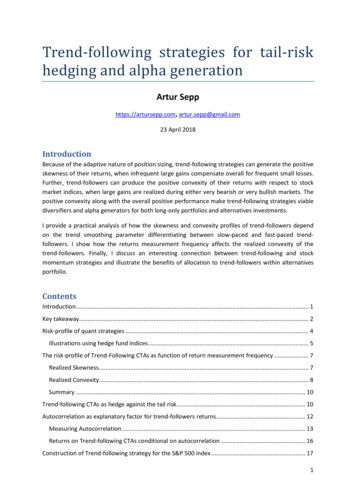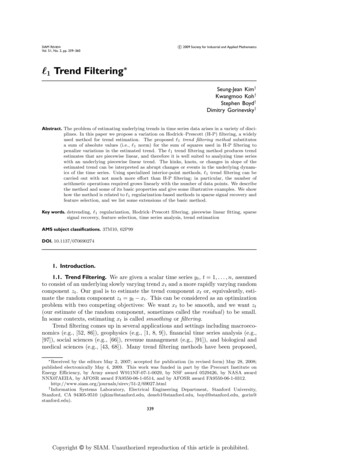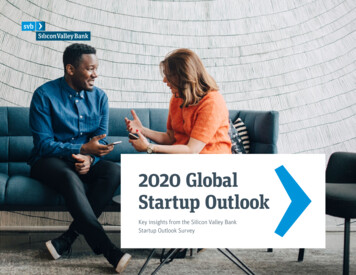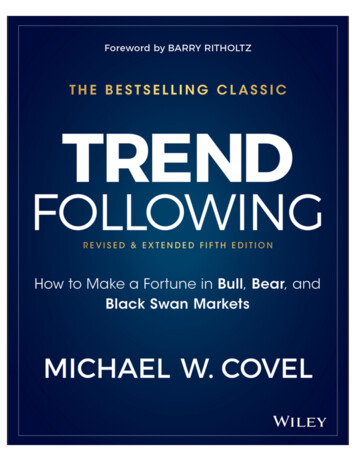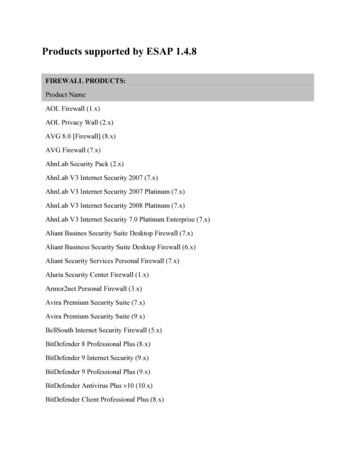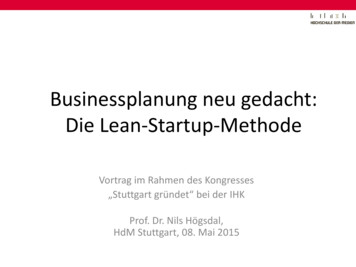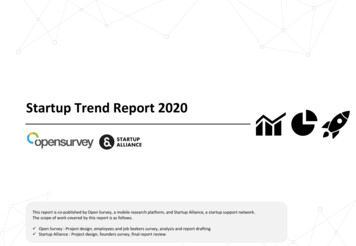
Transcription
Startup Trend Report 2020This report is co-published by Open Survey, a mobile research platform, and Startup Alliance, a startup support network.The scope of work covered by this report is as follows. Open Survey : Project design, employees and job Seekers survey, analysis and report drafting Startup Alliance : Project design, founders survey, final report review
Startup Trend Report 2020Part A. Survey Abstract3Part B. Summary of Results4Part C. Detailed Breakdown of Results1) Founders2) Startup Employees3) Corporate Employees4) Job Seekers113147622
Startup Trend Report 2020A. Survey AbstractTitleStartup Trend Report 2020PurposeTo understand the perception and reality of those participating in South Korea’s startup scene,with a focus on the IT/knowledge service industry.1) 166 Founders- Subjects : Founders/Co-founders- Experience Level : 38 founders within a year of starting business, 74 within 1-3 years,54 with over 3 years of running startups2) 250 Startup EmployeesSubjects- Subjects : Employees of local startups/venture businesses3) 500 Corporate Employees- Subjects : employees of local corporates with over 1,000 current employees4) 200 Job Seekers- Subjects : Job Seekers currently in college/graduate school1,116 TotalPeriodSeptember 18 – 28, 20203
Startup Trend Report 2020B. Summary of Results(Unit: Points)2018Urgent Improvements for Startups (N 166, Founders)201968.073.4*Overlaps in 2018, 2019 (2 responses), 1st 2nd ranking responses in 2020202071.358.6Overall Atmosphereof Startup Ecosystem(N 166, Founders)65.92018201920201stDeregulation(online commerce laws)(53.5%)Obtain initialcapital/increaseinvestment (41.6%)Obtain initialcapital/increaseinvestment (46.4%)2ndObtain initialcapital/increaseinvestment (34.2%)Deregulation(online commerce laws)(39.6%)Secure talents (36.7%)3rdSecure talents(28.9%)Encourage M&A/IPOs(32.9%)Encourage (N 166, Founders)Organization Providing Most Active Support for Startups(N 166, Founders)Most Preferred Investor (N 166, Founders)AcceleratorsVCBusiness1st MashUp Angels (18.7%) Altos Ventures (20.5%)1st Naver (28.9%)2nd Primer (18.1%) Kakao Ventures (15.1%)2nd Kakao (21.1%)3rd SparkLabs (10.2%) BonAngels Venture Partners (9.6%)3rd Lotte (9.6%)*Founders 2018(N 161), 2019(N 171), 2020(N 166)Government Agency KISED (Korea Institute of Startup andEntrepreneurship Development)(27.7%) Seoul Business Agency (SBA)(15.7%) CCEI (Creative Economy InnovationCenter) (15.1%)4
Startup Trend Report 2020Founders (N 166)Startup Employees (N 250)Corporate Employees (N 500)B. Summary of ResultsJob Seekers (N 200)Startup ImageStartup Life Satisfaction (N 250, Startup Employees)Negative14.4%Positive45.6%Satisfaction Factors (N 250)39.2 33.212.627.6 22.422.640.07.69.84.46.6Prompt/flexible decision making ung/freshLively/energeticAutonomous/horizontal organization culture edUnsure Satisfiedsatisfiedsatisfiedat allLeaving for Startups (N 500, Corporate Employees)Positive17.6%Negative57.0%Positive (N 88)Negative41.0%Accomplishment from rapid growth (31.8%)Autonomous/horizontal organization culture(26.1%)25.415.42.2Did notStronglyDid notConsiderconsiderUnsureconsiderconsideredat alledNegative (N 285)Anxiety towards job instability (40.0%)Concerns on reduced welfare benefits (38.9%)Welfare benefits (wage)(32.4%)Lack of leaders/role models (26.8%)Perceptions on Startup Employment (N 200, Job Seekers)Positive23.0%18.522.5Positive (N 46)Autonomous/horizontal organization culture (39.1%)36.033.024.0Dissatisfaction Factors (N 250)Sense of duty in making value(17.4%)20.5Accomplishment from rapid growth (17.4%)2.5NeverNotStronglyUnsure Considerconsider considerconsiderNegative (N 82)Anxiety towards job instability (45.1%)Difficulties in career planning(26.8%)5
Startup Trend Report 2020Founders (N 166)Startup Employees (N 250)Corporate Employees (N 500)B. Summary of ResultsExperience of TelecommutingForms of Telecommuting56.653.044.839.232.516.0Adopted before COVID-1924.310.86.4Adopted after COVID-19No telecommuting24.5Similar/no differenceCompletetelecommuting41.120.510.1 9.8Preferred Form in the Future25.441.2 44.940.613.5 13.826.618.9 24.6Allowed toPeriodicPartial telecommutingtelecommute whentelecommuting/ partial office workneeded(monthly/weekly basis)Telecommuting Efficiency37.731.3Prefer office work37.044.137.035.438.537.733.318.9Prefer telecommutingEffectiveNo difference42.625.431.3Ineffective6
Startup Trend Report 2020Founders (N 166)Startup Employees (N 250)Corporate Employees (N 500)B. Summary of ResultsObstacles in Telecommuting52.263.057.2Corporate Support on Telecommuting60.1 61.6 tractions in homeenvironmentCorporate cultureprioritizing F2F/realtime reports, meetings,approval50.0 46.4 45.127.3Securing work-lifebalance49.242.634.114.9Efficient solutions(internal system,collaboration tools)Improved corporateculture (minimize F2Freports, etc.)Support fortelecommutingenvironment(chair, monitors, etc.)29.0 30.3Clear guidelines onpunctuality, tasksMain Teleconference SolutionsMain Collaboration ToolsStartup Employees(N 250)Corporate Employees(N 500)1위0Not in use(21.4%)Not in use(36.0%)Internal system(52.2%)2위1Zoom(30.0%)Internal solution(40.8%)Slack(18.4%)MS Teams(14.2%)3위2Google ternal solution(13.2%)MS T(14.6%)Startup Employees(N 250)Corporate Employees(N 500)1위0Not in use(33.2%)Not in use(26.6%)2위1Internal system(20.8%)3위237
Startup Trend Report 2020B. Summary of Results#Depressing atmosphere due to COVID-19#Urgent needs in obtaining initial capital/vitalizing investment/securing talents#Telecommtuing introduced even before COVID-19Startup Founders' Thoughts The 2020 ecosystem atmosphere scored approximately 71 points, which decreased over the last year (73 points). While the negative perception of the startupecosystem atmosphere lingers due to tepid support from venture capitals, approximately 57.8% expect an improved atmosphere in the following year,demonstrating anticipation towards the market after the end of the COVID-19 era. The founders rate the government's role in vitalizing the startup ecosystem with 66.5 points, similar to last year (65.9 points).The founders voice the necessity of ‘obtaining initial capital/increased investment’ and ‘securing talents,’ and believe that the deregulation of ‘Personal InformationProtection Act, deregulation for financial business, and restrictions on data’ is vital to the industry. 37.3% of the founders expanded their business overseas. Among those who have not, 70.2% consider expansion positively, but the rate declined over last year (82.1%). Founders identify KISED, SBA, and CCEI among government agencies and Naver, Kakao, and Lotte among companies that provide the most active support for domesticstartups (1st ranking). 32.5% of the founders introduced telecommuting before COVID-19, and 56.6% adopted telecommuting after COVID-19.Most allow telecommuting when needed or encourage complete telecommuting. While 42.6% of founders perceive telecommuting as less efficient than working atthe office, they also felt no significant difference (38.5%) or that telecommuting is more efficient (18.9%).8
Startup Trend Report 2020B. Summary of Results#Slight decline in satisfaction towards startup life#Startup perceived as unstable/uncertain#Employees freely telecommute but also prefer working on-siteStartup Employees' Thoughts 45.6% of startup employees are satisfied with startup life, and the rate decreased over the last year (-8.8%p).Startup employees identify ‘welfare benefits (wage)’ and ‘lack of leaders/role models’ as factors affecting dissatisfaction. Approximately 34.4% of startup employees recommend startup jobs, and the ratio of both recommending and not recommending startup jobs increased slightlycompared to last year. Most recommend startups with early-stage investment due to the benefit of enjoying an unconstrained work environment with a certain levelof security. Most startup employees perceive startups as ‘innovative/creative’ (39.2%) and ‘young/fresh’ (27.6%), but there are needs to assure job security as some perceivestartups as ‘unstable/uncertain’ (12.0%). 55.2% of startup employees have telecommuted before or after COVID-19, and most are allowed to telecommute when necessary.However, it is possible to see that they do not prefer telecommuting unconditionally, as they like to telecommute (37.0%) at a similar rate to working at the office(37.7%) in the future. 37.0% of startup employees perceive telecommuting as efficient and identify ‘distractions in the home environment’ (57.2%) and ‘difficulties incollaboration/communication’(52.2%) as obstacles in telecommuting.9
Startup Trend Report 2020B. Summary of Results#Less willing to start a business/leave for startup#Startups are innovative but hold risks of uncertainty#High preference for telecommuting in the futureCorporate Employees' Thoughts The rate of corporate employees positively considering starting a business (42.4%) and leaving for a startup (17.6%) decreased slightly compared last year.‘Anxiety towards job instability’ and ‘concerns on reduced welfare benefits’ appear to be hindering their decision to leave for a startup job. Most corporate employees perceive startups as ‘innovative/creative’ (33.2%), followed by ‘young/fresh’ (22.4%).However, more corporate employees point out the ‘unstable/uncertain’ nature of startups in 2020 (22.6%) compared to 2019 (6.2%), probably due to concernsabout the increasing economic uncertainty due to COVID-19. 59.4% of corporate employees have telecommuted before or after COVID-19, and most of their companies designated portions of employees for eithertelecommuting and office work. A higher ratio of corporate employees prefers telecommuting (44.1%) than working at the office (31.3%) in the future. 35.4% of corporate employees perceive telecommuting as efficient, and the rate is slightly lower than that of startup employees.Large corporations focus on providing active support and investment in enhancing the telecommuting environment (telecommuting setup/monitors, desks). Corporate employees identify ‘difficulties in collaboration/communication’ (63.0%) and ‘corporate culture prioritizing F2F/real-time reports, meetings, approval’(40.7%) as main obstacles in telecommuting.10
Startup Trend Report 2020B. Summary of Results#Growing pessimism on startup jobs compared to the previous year#Content/media industry takes the spotlight when starting a business#Under the same conditions, job seekers prefer companies that allowtelecommuting when necessary over those that restrict work to the officeJob Seekers' Thoughts The rate of job seekers considering starting a business or getting a startup job decreased compared to last year due to the ‘anxiety towards jobinstability’ (45.1%) lingering among young job seekers. If starting a business, most job seekers take an interest in content/media (25.4%), followed by software development (11.3%) and manufacturing(11.3%), respectively. Job seekers identify ‘Woowa Brothers’ as the representative startup and they are curious about the way the company works. Under the same conditions, job seekers prefer companies that allow telecommuting when necessary (51.5%) more than companies that restrict thework environment to an office (4.0%).11
Startup Trend Report 2020B. Summary of Results#Depressing atmosphere due to COVID-19#Long-term expectations#Demands on a variant work system shed light on the autonomous cultureStartup Ecosystem 2020 According to the founders’ evaluation of the startup ecosystem and satisfaction of startup employees on startup life, the overall atmosphere grew depressed due toCOVID-19. Concerns on the uncertainty significantly increase in the eyes of those outside the startup scene. However, in the longer term, expectations remain forcircumstances after the end of COVID-19. Among investors, founders prefer MashUp Angels and Primer as accelerators and Altos Ventures and Kakao Ventures for VC.Founders identify Naver and Kakao as companies and KISED and SBA as government agencies providing active support for startups. 70.8% of startup employees are most satisfied with their startup life because of an ‘autonomous/horizontal organization culture.’39.1% of job seekers considering getting startup jobs and 26.1% of corporate employees considering leaving for a startup job identified an ‘autonomous/horizontalorganization culture’ as the main reason for considering a startup. The introduction of telecommuting due to COVID-19 highlighted the flexible and unconstrained culture of startups. Unlike large corporations, startups allow‘telecommuting whenever necessary,’ and even with their system’s unconstrained nature, telecommuting efficiency is evaluated as similarly or more efficient thancorporate employees. However, the founders perceive telecommuting as inefficient (42.6%) at a similar level to the rate of perceiving office work as similarly ormore efficient (57.4%). Startup employees and corporate employees experience different obstacles when telecommuting. A significantly lower ratio of startup employees experiencedifficulties due to ‘corporate culture prioritizing F2F/real-time reports, meetings, approval’ (19.6%) compared to corporate employees (40.7%).12
Startup Trend Report 20201) Founders-Survey Size: 166 Total-Subjects: Founders/Co-founders-Experience Level: 38 within a year of starting business, 74 within 1-3 years,54 with over 3 years of running startups
Startup Trend Report 2020C-1. Responses from FoundersThe average rating on the ecosystem atmosphere decreased over last year, and the range ofdecline is highest among founders under 1 year of starting a business.The total average of 71.3pts decreased (-2.1pts) over last year’s 73.4pts. While the difference between experience level is not significant,the range of decline is highest among founders under 1 year of starting a business (-4.5pts).Total Average: 71.3 pts 2.1(2019 : 73.4 pts)(2018 : 68.0 pts)Under 1 yr of founding(N 38) 9.275.766.41-3 yrs of founding(N 74) 4.571.2 4.869.674.4Over 3 yrs of founding(N 54) 3.471.0 4.967.272.1 0.371.8201820192020Q. How would you rate the recent atmosphere of the startup ecosystem out of 100?14
Startup Trend Report 2020C-1. Responses from FoundersFounders negatively perceive the overall ecosystem atmosphere compared to last yeardue to tepid support from venture capitals.The ratio of those who positively evaluate the atmosphere to last year (41.0%) decreased significantly to the previous year (-15.4%p).‘Improved social recognition’ influenced the positivity the most, while ‘tepid support from venture capitals’ impacted the negativerecognition the most.Positive Recognition of StartupEcosystem Atmosphere201847.7% 8.7201956.4% 15.4202041.0%Reasons for Positive Recognition (n 68) 1stReasons for Negative Recognition (n 56) 1st1stImproved social recognition (39.7%)Tepid support from venture capitals (26.8%)2ndActive support from venture capitals(17.6%)Failures in government policies (17.9%)3rdFounder empowerment (proven performance)(17.6%)Lack of mergers and acquisitions/initial public offerings (12.5%)Q. Compared to a year ago, how has the overall atmosphere of the startup ecosystem changed?Q. Why do you think positively/negatively about it? Please select the top three reasons for your view.15
Startup Trend Report 2020C-1. Responses from FoundersExpectations for a better atmosphere in the following year slightly increased to last year.57.8% of founders forecast a more positive atmosphere for the future ecosystem, and the rate slightly increased over the last year( 2.1%p). ‘Improved social recognition’ and the possibility of ‘adapting to COVID-19 and attempting new changes’ appear to have affectedthe positivity.Negative13.9%Positive57.8%(2019) 12.8%- Economic crisis/aggravating economy“Prolonged COVID-19 unstable stock marketdue to liquidity overage worsening economy.”“The difficulties in the real economy willincrease, and startups that cannot achieveimmediate performance will suffer.”- Increasing difficulties due to COVID-19“Direct investment will be intimidated as thedevelopment of COVID-19 vaccine is slow, andthe worldwide crisis (including the U.S.)continues unabated.”(2019) larto presentPositiveHighlypositive- Improved social recognition“Government and VC programs havediversified, and we gained expertise. Theoverall culture is maturing with an increasingnumber of accelerated teams and successfulfounders as they share their success tips.”- Adaptation/attempts in COVID-19 era“COVID-19 brought a significant change tothe market, and this becomes an opportunityfor startups.”Q. How do you think the atmosphere of the startup ecosystem will change a year from now (2021)?Q. Why do you think positively/negatively about it? Please describe your reason in detail.16
Startup Trend Report 2020C-1. Responses from FoundersFounders rate the government's role in vitalizing the startup ecosystem with 66.5pts ( 0.6pts).The government's role in vitalizing the startup ecosystem scores similarly to the previous year. ( 0.6pts).While those under 1 year of starting a business rated the government’s role with a slightly lower score (-1.8pts), their rating is higherthan those over 1 year of founding.Total Average: 66.5pts 0.6Under 1 yr of founding(N 38)1-3 yrs of founding(N 74)Over 3 yrs of founding(N 54)201820192020 12.0 1.8(2019: 65.9 pts)(2018: 58.6 pts)71.659.569.860.0 6.0 1.466.064.656.7 7.5 2.464.266.7Q. How would you rate the government’s role in vitalizing the start-up ecosystem out of 100?17
Startup Trend Report 2020C-1. Responses from FoundersFounders feel an urgent need for funding and deregulation.In 2020, founders voiced the necessity of ‘obtaining initial capital/increased investment’ just like in 2019 and emphasized ‘securingtalents’ more than ever. Founders identified the ‘Personal Information Protection Act, deregulation for financial business, andrestrictions on data’ as areas in need of deregulation.Urgent ImprovementsPreferred Areas for Deregulation2018 (N 114)2019 (N 149)2020 (N 166)- Personal Information Protection Act“The range of personal/sensitive information needs to be defined more clearly (to the minimum range if possible) to vitalize the data industry.”Obtain initial capital/increaseinvestment (46.4%)- Deregulation for financial business“Lowering bars on the qualification and range ofFinTech-related financial businesses and openbanking participants.”Deregulation2nd(online commerce laws) (39.6%)Secure talents (36.7%)- Restrictions on data“There are excessive data restrictions and thecontrol on medical data telemedicine laws shouldbe alleviated for the post-COVID-19 era.”Encourage M&A/IPOs(32.9%)Encourage M&A/IPOs(29.5%)1stDeregulation1st(online commerce laws) (53.5%)Obtain initial capital/increaseinvestment (41.6%)2ndObtain initial capital/increaseinvestment (34.2%)2nd3rdSecure talents(28.9%)3rd1st3rd- Simplification of administrative procedures“Publicly-funded startup application should beprovided in various document forms besides hwp.YC only requires a short, 50 characters descriptionof the service, and the government’s form needsimprovement.”Q What are the three elements that need an urgent reform to promote growth within the current startup ecosystem?Q Which part of the government regulation related to your business do you think should be mitigated?*Overlaps in 2018, 2019 (2 responses), 1st 2nd ranking responses in 202018
Startup Trend Report 2020C-1. Responses from FoundersFounders perceive wage subsidies and the provision of office spaces as the most helpfulgovernment assistance.Founders identify 'wage subsidies’ and the 'provision of office space' as the most helpful government aids in vitalizing the startupecosystem and wish for 'deregulation/regulation reform’ and 'fair operation/less intervention' from the government.Government Aids inVitalizing Startup Ecosystem1stWage subsidies(ex. income tax exemption)(32.5%)2ndProvision of office space(ex. Creative Economy Innovation Center)(28.9%)3rdInitial direct investments(22.3%)Additional Government Assistance- Deregulation/regulation reform“Many industries achieve limited growth due to regulations. The government and its bodiesfail as mediators as they are highly defensive and make elementary judgments onillegitimacies, resulting in risks for startups in running the businesses.”“The government regulations should not push startups on the line and present a predictablefuture. It is currently impossible to know how the law changes, and the startups are notincluded in the legislation process.”- Fair operation/less intervention“The government should stop trying to play a certain role and begin removing irrational andunessential factors for enhancement. While there have been some improvements, there isstill an overload of administrative efforts that seem unnecessary in government researchprojects or support projects.”“If this was a soccer game, the government should play the judge that helps the flow of thegame. It’s a shame that the government is trying to be a player than a judge in the freemarket economy, and we wish for it to provide fair help for business growth.”Q. Which government policy do you think was most helpful in vitalizing the startup ecosystem?Q. What additional roles should the government play to vitalize the startup ecosystem?19
Startup Trend Report 2020C-1. Responses from Founders37.3% have expanded the business overseas, and 70.2% of those who have not, considerexpansion positively.37.3% advance to global markets, and the rate of expansion increases among those with higher years of founding. While 70.2% of thoseonly running businesses locally consider expansion positively, the rate of considering international business decreased over the last year.Overseas ExpansionTotal(N 166)No Expansion62.7(2019)63.8%Overseas Expansion Preference (N 104)Under 1yr offounding(N 38)1-3yrs(N 74)59.5Over 3yrs(N 54)Negative10.6%Positive70.2%(2019) 7.4%(2019) 9)36.2%40.526.3Q. Do you currently have an expanded business abroad?Q. Are you currently considering overseas ansion20
Startup Trend Report 2020C-1. Responses from FoundersFounders are especially interested in SE Asia and U.S. markets and feel the need forlocal market research and information.In terms of regions, founders continuously demonstrate a high interest in SE Asia and the U.S., and they feel the need to research thelocal market and obtain information.Preferred Countries for Expansion/Expansion Requisites(N 73)Reasons for Not Preferring Expansion(N 11*)35.6Local market research/analysis20182019“It is not time yet.”2020Network1st2nd3rdU.S.SE AsiaChina,JapanSE AsiaU.S.Japan20.5“Our business is not adequate for overseas expansion.”SE AsiaFunding13.7Secure workforce12.3Distribution channel/market12.3U.S.Japan“The cost of globalizing our content is highly expensive.”“Our service is localized for South Korea’s system.”Communication“We are considering attracting foreign tourists but notoverseas expansion yet as we run a regional business.”5.5Q. If so, which region/country are you considering?Q. If you are considering several regions, select the region that is the most central to your business plan.Q. What should be prioritized in preparing for overseas expansion? Q. Why do you not consider overseas expansion?* Small base21
Startup Trend Report 2020C-1. Responses from FoundersFounders identify KISED and SBA as the most active government agencies.Founders identify KISED and SBA as the most active government agencies, followed by CCE and KOCCA(1st 2nd 3rd in unaided awareness).Aided Awareness (1 2 3 ranking)53.0Aided Awareness** (1st)Unaided .44.81.8KISEDSBACCEIKOCCA(Korea Institute ofStartup andEntrepreneurshipDevelopment)(Seoul BusinessAgency)(Creative EconomyInnovation Center)(Korea CreativeContent Agency)NIPA12.08.46.62.412.04.21.20.6KITA(National IT Industry (Korea InternationalPromotion Agency) Trade Association)3.60.63.00.03.05.41.2 1.81.2 1.2 1.2KOTRAB2GKISAFACTKwater(Korea TradePromotionCorporation)(Born2Global)(Korea Internet &Security Agency )(Foundation of Agri,Tech,Commercializationand Transfer)(Korea WaterQ. Which government agency most actively supports domestic startup activities?ResourcesCorporation)* Unaided Awareness – Subjective response w/o examples** Aided Awareness - Multiple choice22
Startup Trend Report 2020C-1. Responses from FoundersFounders perceive Naver, Kakao, and Samsung as companies that are most active inproviding startup assistance.Founders identify Naver as the domestic company providing the most active support for startup activities, followed by Kakao, Samsung,Lotte, and SK, respectively.Aided Awareness (1 2 3 ranking)63.9Aided Awareness** (1st)Unaided Kakao8.43.6Samsung9.65.4Lotte10.25.4 6.0SK6.01.8HyundaiMotors1.2 2.4GS9.61.2 1.8HanhwaQ. Which company most actively supports domestic startup activities?2.43.0 5.4LG0.6 4.80.6 3.60.6 3.01.8 3.00.0 1.8 1.2 1.2 1.20.60.00.00.00.0KTPOSCOCJHyundai NC Soft ShinsegaeHeavyIndustries* Unaided Awareness – Subjective response w/o examples** Aided Awareness - Multiple choice23
Startup Trend Report 2020C-1. Responses from FoundersFounders are most interested in Toss, Danggeun Market, Woowa Brothers, Coupang, andMarket Kurly.Founders identified 'Toss’ as the fastest-growing startups they are interested in the way of working, and the interest in Danggeun Marketincreased significantly in 2020.Interested Startups on Ways of WorkingTossFastest-Growing Local StartupsToss22.9Woowa Bros./Baedal Minjok9.6Danggeun MarketDanggeun Market9.0Coupang4.2Market arket Kurly10.2Woowa Bros./Baedal MinjokQ. Which startup are you most curious about the way they work? (Select all)Q. Which do you think is the fastest growing startup in South Korea? (Select all)Hyperconnect9.63.6Viva Republica2.4Today House1.8Musinsa1.824
Startup Trend Report 2020C-1. Responses from FoundersFounders experience difficulties convincing their products/services when attractinginvestment and demonstrate a need for advice on growth strategies and funding.Founders identify ‘convincing products/services’ as the biggest obstacle in attracting investment and wish to obtain advice on‘growth strategies,’ ‘investment,’ and ‘organization management.’Obstacles in Attracting InvestmentPreferred Advices on Business OperationGrowth strategiesConvincing Accurate valuation and recognition34.334.9Organization management30.7Personnel managementFunding agreementOthers15.19.0Global expansion25.9Strategy roadmap25.923.5General managementDecision making11.4Q. Please select one most critical obstacle you experienced when attracting investment.Q. If you could obtain unconstrained advices from someone on operating your business, what advice would you seek?25
Startup Trend Report 2020C-1. Responses from FoundersFounders are most aware and prefer ‘Primer’ and ‘MashUp Angels’ among early-stageinvestors.Founders are most aware and prefer ‘Primer’ and ‘MashUp Angels,’ and D-Camp place 3rd on the 1st 2nd 3rd rank inpreference.Unaided Awareness(N 166)1st Preference(N 166)1st 2nd 3rd Preference(N 166)1stPrimer (16.3%)MashUp Angels (18.7%)Primer (40.4%)2ndMashUp Angels(15.7%)Primer (18.1%)MashUp Angels (33.7%)SparkLabs (10.2%)D-Camp (25.9%)3rdLotte Accelerator(11.4%)SparkLabs (11.4%)* Unaided Awareness – Subjective response w/o examples** Preference - multiple choice among presented optionsQ. Please write down one institution that first comes to mind when you think of an early-stage investment company.Q. Select up to three early-stage investment companies you would like to attract investment from in order of preference.26
Startup Trend Report 2020C-1. Responses from FoundersFounders are most aware and prefer ‘Altos Ventures’ among venture capitals.Founders demonstrate high awareness and preference towards ‘Altos Ventures’ (1st ranking), followed by ‘Softbank Ventures’ (2nd).However, ‘Kakao Ventures’ newly come into the scene in 2020, placing 2nd on the 1st rank in preference.Unaided Awareness(N 166)1st Preference(N 166)1st 2nd 3rd Preference(N 166)1stAltos Ventures (18.1%)Altos Ventures (20.5%)Altos Ventures (52.4%)2ndSoftbank Ventures (10.8%)Kakao Ventures (15.1%)Softbank Ventures (38.0%)3rdKorea Investment Partners (7.8%)BonAngels Venture Partners (9.6%)Kakao Ventures (31.9%)* Unaided Awareness – Subjective response w/o examples** Preference - multiple choice among presented optionsQ. Please write down one institution that first comes to mind when you think of venture capital.Q. Please write down three venture capitals you would like to attract investment from in order of preference.27
Startup Trend Report 2020C-1. Responses from Founders32.5% of founders introduced telecommuting before COVID-19, and the rate oftelecommuting amounted to 89.2%, including its adoption after COVID-19.A high rate of those with older businesses has adopted telecommuting before COVID-19. 14.9% of founders with a1 to 3-year-old business did not introduce telecommuting, which is relatively higher than other founder groups.Total(N 166)Under 1yr of founding(N 38)26.332.5Before COVID-1919.9Regularly after COVID-1926.389.2%94.7%1-3yrs(N 74)Over 3yrs(N 54)32.437.017.685.1%18.590.7%Temporarily after COVID-19No telecommuting36.710.835.135.242.15.314.99.3Q. Have you ever introduced tel
7.6 4.4 33.2 22.6 22.4 9.8 6.6 Creative/ innovative Unstable/ uncertain Young/ fresh Lively/ energetic Reckless/ risky 5 B. Summary of Results Founders (N 166) Startup Employees (N 250) Corporate Employees (N 500) Job Seekers (N 200) 33.0 24.0 25.4 15.4 2.2 Did not consider at all Did not consider Unsure Consider-ed Strongly consider-ed 18.5 22 .
